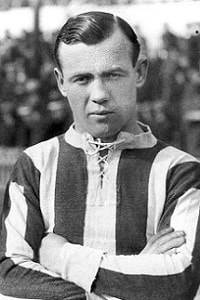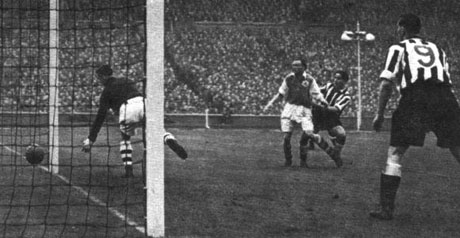139. Hughie Gallacher
One of Scotland’s ‘Wembley Wizards’ who provided a famous victory over England in 1928, centre-forward
Hughie Gallacher was one of the most prolific goalscorers in British football through the 1920s and 1930s. He scored more than 400 goals in an 18 year club career and averaged more than a goal a game for the
Scottish national team, but faced many personal problems which ultimately led to him tragically taking his own life in 1957.
Born Hugh Kilpatrick Gallacher in the town of Bellshill on 2 February 1903, Hughie Gallacher grew up playing football from a very early age. At the age of 15 he started working down mines but was still able to set out on a career in amateur football. Although relatively slightly built and only 5’5″ tall, his strength and power belied his physical appearance. Hughie Gallacher dribbling skills enabled him to beat defenders with ease and the fact that he could shoot powerfully with either foot meant that it was only likely to be a matter of time before professional clubs took notice of him. His style of play was also highly controversial, with a tendency for very tough tackling and even imitating opponents’ voices to fool goalkeepers and standing on their feet while waiting for corner kicks to be taken.

After starting out with Tannockside Athletic and Hattonrigg Thistle, Hughie Gallacher joined Bellshill Athletic and late in 1920 was selected to play for a Scottish Junior selection against Ireland. It was there that Hughie Gallacher attracted the attention of the relatively recently formed Queen of the South, and he made the move into professional football for the first time. His stay with the Dumfries club was relatively short, as he contracted pneumonia whilst on holiday but during his recovery he was approached by First Division side Airdrieonians and joined them ahead of the 1921-22 season.
After a season split between the reserves and the first team, Hughie Gallacher became a regular first team player in 1922-23, and help Airdrie to their highest ever finish of second in the Scottish league. In 1923-24, he scored 33 league goals as Airdrie finished as runners-up again, and also reached the Scottish Cup final against Hibernian. The 2-0 win gave the club their first major trophy and Gallacher his first major honour, and that season also brought a first international cap in a 2-0 win over Northern Ireland. After helping Airdrie to a third consecutive second place finish in 1924-25, again breaking the 30 goal mark and scoring five goals in the Home International Championship, Hughie Gallacher had attracted the attention of several of England’s top clubs. Late in 1925 he moved south of the border to play for Newcastle United, making his debut on 12 December of that year against Everton, scoring twice.
Hughie Gallacher notched his first international hat-trick in February 1926 against Northern Ireland, and scored 23 goals in 19 appearances for Newcastle in his first half-season. By the 1926-27 season, Hughie Gallacher had been named Newcastle captain. He went on to score a remarkable 36 goals in 38 league games, still a club record, and led the team to the league title as they finished five points ahead of Huddersfield Town. Newcastle were unable to retain their title in 1927-28, but that season did provide one of the highlights of Hughie Gallacher’s international career as he was part of the Scotland team that crushed England 5-1 at Wembley. Although he did not score in the match, Hughie Gallacher was involved in several of the Scottish goals.
In the 1928-29 Home International Championship, Hughie Gallacher scored a remarkable seven goals in two games against Wales and Northern Ireland as Scotland claimed the title, and by the summer of 1930, he had finished as Newcastle’s top scorer for four consecutive seasons. However, he frequently found himself in dispute with the club’s directors. He had a tendency to seek his own retribution for the tough tackling he often received on the field, was suspected of playing whilst drunk and found himself in financial trouble when he obtained a divorce in order to remarry. The club agreed to sell him to newly promoted Chelsea, and after scoring 133 goals in 160 league games for Newcastle he moved south to London.
Hughie Gallacher would stay at Chelsea for four years, scoring 81 league goals, but was unable to help the club to win any major trophies. The closest he came was an FA Cup semi-final in 1932 against Newcastle of all clubs. Hughie Gallacher scored in the match, but was unable to prevent a 2-1 defeat. His volatile nature continued to cause problems, as he was banned for two months for swearing at a referee, and in 1934 he was declared bankrupt. Eventually, Chelsea decided that off-field problems were affecting his play, and sold him to Derby County in November of that year.
In a season and a half with Derby, he scored 38 goals in 61 league games and appeared to have put off-field problems behind him, but his time at Derby would be the source of further controversy some time after he left the club. It was alleged that he received an illegal signing-on fee, something which he never admitted but for which Derby’s then manager received a 10 year ban. It was during his time at Derby that Hughie Gallacher’s international career came to an end, with his final cap coming in a 2-0 win over England in April 1935. In all he scored 23 goals in just 20 internationals, a total which still places him third on Scotland’s all-time list.
For the 1936-37 season Hughie Gallacher dropped into the Third Division South to play for Notts County, scoring 32 goals as the club narrowly missed out on promotion, finishing two points behind champions Luton Town. Now in his mid-30s, Hughie Gallacher’s career appeared to be in decline but he still made a return to the top division in January 1938, joining Grimsby Town. He scored three goals in 12 games, and helped the club narrowly to avoid relegation.
In the summer of 1938, Hughie Gallacher moved back to Tyneside to join Gateshead, of the Third Division North. He felt at home in the region, and would remain there for the rest of his life. His signing caused Gateshead’s crowds to increase dramatically, and he scored 18 league goals for the club in the 1938-39 season. However, a few games into the following season competitive football was suspended due to the Second World War and that break in league action caused his playing career to come to an end. Altogether he scored 296 goals in the English leagues, the 12th highest total of all time.
After his retirement, the football authorities prevented Hughie Gallacher from becoming a manager, owing to his frequent run-ins with them and with the police. He worked as a labourer and part-time as a journalist on Tyneside. Personal problems began to mount up, however, and he began to drink even more heavily than he had in his playing days. In 1950, tragedy struck when his wife died suddenly of a heart attack. Hughie Gallacher was devastated, and became very depressed.
In May 1957, during an argument at home, Hughie Gallacher threw an ashtray at one of his sons, hitting his head and drawing blood. He was filled with remorse, but an assault charged followed and the media reaction was fierce. Unfounded allegations of abuse and neglect appeared in the newspapers. Hughie Gallacher knew that what he had done was wrong, but also felt that he was being made the victim of a media witch-hunt. Severely depressed, he could see no way out. He was called to appear before magistrates on 12 June, but committed suicide the day before by jumping in front of a train. He was 54 years old.



